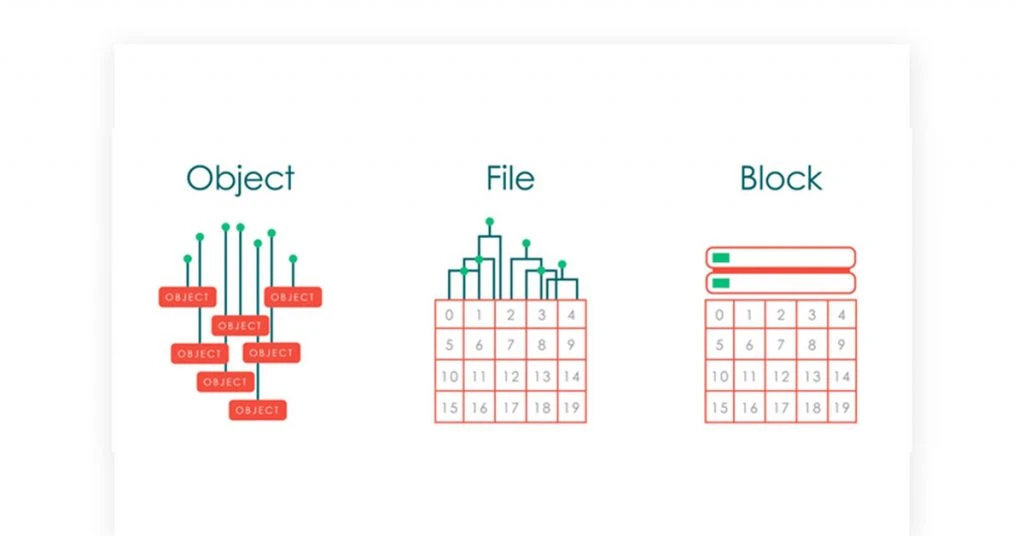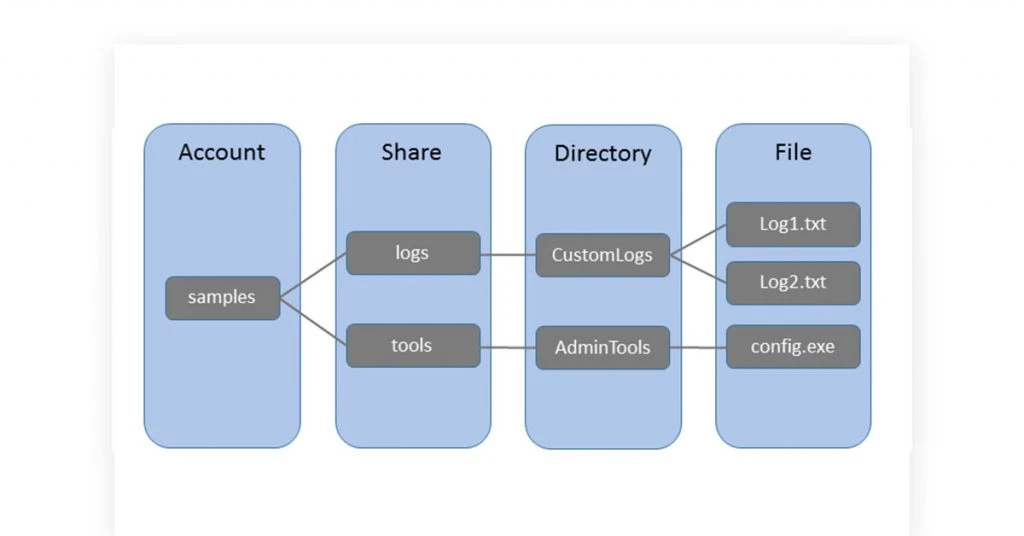Amazon AWS vs Microsoft Azure: Storage Comparison

All organizations worldwide are moving towards digital transformation to stay competitive in today’s world. Cloud is the enabler of digital transformation. According to a report from Research and Markets, the cloud computing market will grow at a CAGR of 19.1% to reach USD 1,251.09 billion by 2028.
Among the sectors with the highest growing demand for cloud storage, educational institutions and public sector organizations are at the forefront. As the usage of online learning management systems in education is growing; teachers, students, and school administration require safe digital storage and quick access to data.
In the case of public sector organizations, cloud computing helps officials in accessing and handling massive volumes of data easily from anywhere without in-house server maintenance.
The choice of cloud provider fundamentally depends on how you can meet your storage requirements optimally. This blog discusses the storage options given by the leading cloud service providers, Amazon and Microsoft.
Corporate, PSUs, or Colleges – Why Should They Opt for Cloud Storage?
Some of the major benefits that cloud storage provides are:
- Lower Cost Structure: You can rent storage space as per your needs, doing away with the fixed cost of buying storage. Cloud storage also removes the cost of purchasing and maintaining hardware.
- Increased Scalability: You can simply change the plan to upscale or downscale storage capacity. It permits companies to make changes quickly and with little-to-no-hassle.
- Easy Sharing: Multiple users can work on data stored in cloud simultaneously and share files with each other. Authorized users can access documents in real-time.
- Reduced Administrative Tasks: There is no burden on IT staff for managing storage as the responsibility lies with the cloud storage vendor.
- Disaster Recovery: Cloud storage allows organizations to back up their data securely for recovery during disasters. There are no data loss risks as it is stored in data centers managed by the cloud vendor.
Types of Cloud Storage

There are three primary types of cloud data storage available: Object Storage, File Storage, and Block Storage. Let us understand what these terms mean.
- Object Storage
Object Storage is a form of Internet-driven, scalable and high-performance data storage architecture that provides reliable and budget-friendly data durability. Entire data is stored in a single repository that can be made available to various physical storage devices, as per the requirement.
Object Storage service stores an unlimited amount of unstructured data of different content types, including large sets of historical data and rich content, like images, music, and videos. Amazon AWS has termed it as S3 storage while Microsoft Azure storage calls its offering as blob storage.
- Block Storage
Block storage is a type of storage you use to store data files on Storage Area Networks (SAN) or on cloud platforms. Entire data is stored in fixed-size blocks that have unique addresses. Amazon AWS offers block storage under the name EBS while Azure equivalent is disk storage.
- File Storage
File storage is a storage method in which data is accumulated in a hierarchal manner on a network-attached storage (NAS) device or computer hard drive. In file storage, data is stored in files that are organized in folders. The folders are arranged in the form of directories and subdirectories.
Whenever you need to find a file, you must know this route, starting from directory to the file. It is also referred to as file-level or file-based storage.
Amazon AWS vs Microsoft Azure – Cloud Storage Comparison
Both Amazon AWS and Microsoft Azure cloud offer these three types of storage. Hence, we compare how the offerings from AWS are different from Azure. We are focusing on Amazon AWS and Microsoft Azure as they occupy the top two positions in the 180 billion dollars cloud market, respectively, according to a report from Synergy Research Group.
Their customers include financial services, healthcare, public sector organizations, educational institutions, and several other industries. So, most potential clients are confused between AWS and Azure for cloud migration.
Suggested Read: What Are Storage Devices and How Do They Work
Amazon AWS S3 vs Microsoft Azure Blob – Object Storage Comparison
AWS S3 Storage Overview
Amazon S3 or Simple Storage Service allows Amazon AWS users to store data with high scalability and access it with low latency.
Amazon Web Services’ Object storage, Amazon S3, was the earliest option for companies to leverage object storage. Since then, it has been used to store multimedia content by companies handling massive volumes of data, such as Netflix.
Amazon S3 also has strong security and backup and enables schedule deletions from the AWS Panel.
Microsoft Azure Blob Storage Overview
Azure Blobs are available to Azure users on opening the Portal. Programmers can use API to access content in blob storage for various purposes. This object storage allows you to store and access unstructured data at a scale. You can write the program in any language you like.
It’s available in four performance tiers — premium, hot, cool and archive. You can opt for a pay-as-you-go billing model or reserved capacity purchase plans.
AWS S3 Storage vs Microsoft Azure Blob Storage Differences
While S3 and blob are both object storage offerings, they differ in terms of the following:
| Parameter | Amazon S3 | Azure Blob |
| What is it | Object Storage Service of AWS | Object storage service of Azure |
| Composition | Objects in Bucket containers | Blob(s) in Containers in a standard storage account |
| Deployment identifier | Globally unique key | Account level unique key |
| Deployment | Regional | Regional and Zonal |
| Maximum storage size | 100 buckets by default, limit can be increased. No limit on the number of objects per bucket. | 100 accounts per subscription, 500 TB storage account with blob container(s) |
| Size | 0 to 5 TB per object | 190.7 TiB for block, 195 GiB for append, 8TiB for page blobs |
| Composing Objects Support | NA | Append blobs |
| Data durability | 11 9’s or 99.999999999% across multi-AZ; 99.99% objects availability over a given year | 11 9’s in Locally redundant storage (LRS), 12 9’s in Zone redundant storage (ZRS), 16 9’s in geo redundant storage (GRS) |
| Tiers | Standard, Standard Infrequent access, One Zone Infrequent Access, Glacier, Glacier Deep Archive, Intelligent Tiering | Archive, Hot, Cool access tiers; Standard and Premium performance tiers |
| Encryption | Server-side encryption with S3 managed keys (SSE-S3), customer master keys (CMKs) in SSE-KMS, customer provided keys (SSE-C) or Client-side encryption with customer master keys (CMKs) in CSE-KMS, client-side key (CSE-C) | Server-side encryption with Microsoft-managed key, customer-managed key, customer provided key or Client-side encryption |
| Access Control | IAM policies, Bucket policies, Access control list (ACL) | Azure Active Directory with role-based access control (RBAC) |
| Object versioning | Yes | Manual with per object snapshotting |
| Replication | Automatic and asynchronous replication of objects to different destination S3 buckets in same or other AWS regions | Replication of block blobs from a general-purpose v2 storage account to another or a premium block blob account to another. |
| Delete Protection | Versioning and multi-factor authentication (MFA) deletion | Soft delete to retain deleted blobs up to a set time in database |
| Data Analytics | Athena Service for serverless interactive query | Azure Synapse for serverless or dedicated options to query data |
| Pricing | Depends on data storage/ month, number of common API requests, network egress. Pricing rates: 1. Free tier: 5GB for new users in S3 Standard storage class 2. S3 Standard general purpose storage starting at a monthly price of INR 1.91/ GB for the first 50 GB 3. Storage for infrequently accessed data starting at INR 1.05/ GB. 4. Options for archival, retrieval, S3 Intelligent Tiering for unpredictable storage, etc. | Depends on data volume storage/month, data redundancy selections, data transfer costs, types and number of operations performed. Pricing rates: 1. Blob-only storage for frequently accessed data starting at a monthly price of INR 1.5197/ GB for the first 50 TB 2. Storage for data that is not accessed often at a starting price of INR 0.83580/GB 3. Options for data transfer, archival, etc. |
Amazon EBS vs Microsoft Azure Disk – Block Storage
Amazon EBS – Storage Overview

Amazon Elastic Block Storage, also known as Amazon EBS, provides persistent block storage for Amazon EC2 instances that can scale and adapt to meet your performance requirements. It is tightly integrated with EC2 instances, Amazon EBS provides high performance and low latency block storage. You can opt for either SSD-backed storage or HDD-backed storage.
- SSD-Backed Volumes
This option is useful if you wish to support IOPS-intensive workloads.
- Provisioned IOPS Volumes: It is beneficial for mission critical applications and can provide up to 256,000 IOPS, 4,000 MB/s of throughput. Options include io2 Block Express, io2 and io1.
- General Purpose SSD Volumes: General-purpose volumes work for all those cases where you need decent performance and low latency. You can choose from gp3 and gp2, both of which are well suited for latency-sensitive interactive applications, virtual desktops, dev/test environments, and more.
- HDD-Backed Volumes
Businesses can choose this when they have throughput intensive requirements.
- Throughput Optimized HDD Volumes: ST1 is useful if you want to access intensive workloads having large datasets frequently without impacting the throughput. The baseline throughput value is 40 MB/s per TB, and the maximum value goes up to 500 MB/s per volume.
- Cold HDD Volumes: SC1 is an inexpensive option for workloads that are not accessed often. When demands spike, HDD volumes can burst up to 80 MB/s per TB. The throughput performance is usually reliable with a baseline value of 12 MB/s per TB and the highest value of 250 MB/s per volume.
Suggested Read: Azure Pricing Calculator: Estimate Azure VM Cost, Step by Step Guide
Microsoft Azure Disk- Storage Overview
Azure cloud disk storage is used with Azure virtual machines. Azure offers disk storage for different types of workloads. Users can opt for hard drive or solid-state drive depending on their needs.
Azure Standard HDD
If you have non-critical workloads where data is rarely accessed, you can use Azure’s standard HDD managed disks.
- Storage capacity: 32 TiB
- Low IOPS: 2,000 IOPS
- Throughput: 500 MB/s
Azure Standard SSD
Standard SSD is useful for production workloads that are entry level. It can help ensure consistent latency without being expensive.
- Storage capacity: 32TiB
- Low IOPS: 6,000 IOPS
- Throughput: 750 MB/s
Azure Premium SSD
In case of enterprise workloads where you cannot compromise on performance, Azure Premium SSD can be used.
- Storage capacity: 32TiB
- Low IOPS: 20,000 IOPS
- Throughput: 900 MB/s
Azure Ultra SSD
Ultra disk storage works in cases where you have IO intensive and highly demanding applications. The latency remains low, and data is encrypted.
- Storage capacity: 62TiB
- Low IOPS: 160,000 IOPS
- Throughput: 2 GB/s
Suggested Read: SAN vs. NAS vs. DAS Storage: Which One You Choose
Amazon EBS and Microsoft Azure Disks Differences
| Parameter | Amazon EBS | MS Azure disks |
| What | Block storage service for Amazon Elastic Compute Cloud (Amazon EC2). | Block level storage volumes for Azure Virtual Machines |
| Types | SSD-based volumes (io2, io2 Block Express, io1, gp3, gp2), HDD-based volumes (st1, sc1) | Ultra disks, Premium SSDs (solid-state drives), Standard SSDs, Standard HDDs (hard disk drives) |
| Max Size | 64 TB for SSD, 16 TB for HDD based volumes | Ultra-disk- 65,536 GiB, Premium SSD- 32,767 GiB, Standard SSD/HDD- 32,767 GiB |
| Durability | Up to 99.999% for SSD, 99.8% – 99.9% for HDD based volumes | 99.999% enterprise grade availability |
| Encryption | KMS (Key management service) by default | Server side encryption with platform or customer managed keys, Azure Disk encryption |
| Data security | Encryption, threat detection, key management | Encryption, identity and authorization, key management |
| Pricing | Free tier: 30 GB Monthly pricing for: 1. General purpose SSD (gp3): INR 6.99/GB 2. Provisioned IOPS SSD (io2): INR 10.03/GB | Credit of INR 13,300 for new users: 1. Page blobs (SDD-based) starting at INR 1,508.407 for 128 GB 2. Standard page blobs (HDD-based) starting at INR 3.7883/ GB for LRS along with operational charges 3. Managed disks 4. Ultra-disk: INR 0.017602/ hour per GiB 5. 1-year premium SSD starting at INR 64.29 for 4 GiB 6. Standard SSD: INR 25.26 for 4 GiB (Bursting) 7. Standard HDD: INR 129.31 for 32 GiB |
Amazon AWS vs Microsoft Azure – File Storage
Amazon Elastic File System (EFS) Overview
Amazon Web Services’ EFS is a file system that enables scalability, reliability, elasticity, and even concurrent behavior with certain limitations. You can mount Amazon EFS to Amazon EC2 servers. The encrypted file storage can work for both AWS on-premises resources and cloud services.
Microsoft Azure File Storage Overview

Microsoft Azure Cloud files storage service is designed for sharing resources like files, development or debugging tools. You can create and manage your file shares using the built-in UI, through Azure CLI or PowerShell. You can also store an unlimited number of files and are billed only for what you use.
Amazon EFS and Azure File Storage Differences
Some of the major differences between EFS and Azure files are summarized here.
| Parameters | Amazon EFS | Azure file storage |
| What | Shared file systems for AWS compute services | Persistent shared storage for containers |
| Size | 47.9 TiB for a single file | 5 TiB by default, can expand to 100 TiB |
| Contains | Standard, Standard-Infrequent Access, One Zone, One Zone-Infrequent Access | Files in directory stored in file shares in storage account |
| Backup | AWS Backup Service, EFS to EFS Backup solution | Recovery services vault |
| Encryption | AES-256 encryption for data at rest and in transit with KMS | 256-bit AES encryption for classic storage and resource manager accounts with MS or customer managed keys |
| Connectivity | Internet AWS VPN AWS Direct Connect | Internet S2S VPN Express Route |
| Availability | Standard Storage (Multiple Availability Zones) – 99.99% SLA One Zone Storage (Single Availability Zone) – 99.99% SLA | Standard Storage (LRS, ZRS, GRS, GZRS) – 99.9% SLA Premium Storage (LRS, ZRS) – 99.9% SLA |
| Supported protocols | NFS | SMB, NFS, REST |
| Preferred workloads | Linux workloads | Windows, Linux, Mac instances |
| Pricing | No charge for setup. Monthly pricing for standard storage starts at INR 25.28/GB. | No upfront charges. Monthly pricing for data storage (1 GB at rest, 1 GB snapshots) with operations cost start at INR 12.63. |
Suggested Read: AWS vs Microsoft Azure vs Google Cloud Platform (GCP) – Detailed Cloud Comparison
Bottom Line
Both Amazon and Microsoft provide cloud storage services. However, what you opt for and how you use it will have a significant impact on your business expenses and process optimization. For instance, AWS works on per hour pricing while Azure charges by minute. You must opt for the cloud provider that can help you meet your needs without any hassle.
Related Categories: Cloud Management Service | Cloud Security Services | Cloud Analytics Solutions | Cloud Storage
The Techjockey content team is a passionate group of writers and editors dedicated to helping businesses make informed software buying decisions. We have a deep understanding of the Indian software market and the challenges that businesses face when choosing the right software for their needs. We are committed... Read more
















